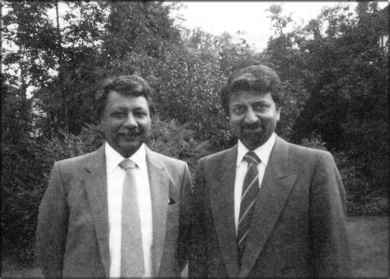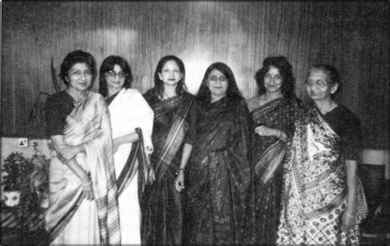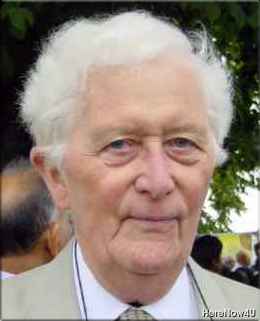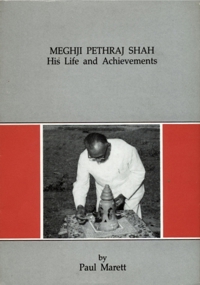
When Meghjibhai retired at the end of 1953, he was still only in his late forties. By that time, at an age when the careers of many successful men are still at a developing stage, he had built up a great fortune and established many successful businesses. His name was well known in East Africa: his advice and support were sought for philanthropic and commercial enterprises. It was unthinkable that retirement would mean inactivity. Meghjibhai was a man of action. We have seen already how his retirement from the day-to-day involvement in business was followed by his involvement in charitable work on an unprecedented scale.
Although he did not sever his connections with Kenya immediately, he spent a good deal of time in India over the next few years. In 1954 and 1955, the family stayed for long periods at the house, which Meghjibhai had built in Jamnagar. Jamnagar is a moderate-sized city with a pleasant character and it was, of course, home to Meghjibhai, for his birthplace in Dabasang is only a few miles away. He also had a second home in India, a flat in Bombay, where he stayed frequently.
In 1955, his outstanding contribution to public life was recognised by his home state when he was appointed a member of the Rajya Sabha, the Council of States, which is the upper house of the Indian Parliament. The 250 members of the Rajya Sabha are elected by the Legislative Assemblies of the different states of India (except a small number who are directly appointed by the President). Appointment to this small and distinguished body must be seen as a very high honour. People welcomed his entry into the Rajya Sabha and it was widely felt that his experience and mature thinking would be a favourable influence on the working of this deliberative and legislative body.
Meghjibhai's parliamentary duties required that he should live in Delhi. However, he soon found that he could not settle to the politician's way of conducting affairs. By nature, he was an active man of business, a man of action. He was accustomed to firm decisions taken swiftly and implemented at once. He was impatient at what he saw as endless talk and delays. Long deliberation, which did not result in concrete actions for the betterment of the people, did not fit his temperament. Although he came into close contact with leading politicians, many of whom sought his advice on national problems, he was never completely at ease with them. He is not known to have made any major contribution to debates in the Council of States as his heart was not in such a debating society and after the first year of his six-year term he decided to resign in 1956.
During these years, Meghjibhai was kept busy. His philanthropic activities made considerable calls on his time and energy: it was not just a question of handing over some money for others to deal with. He was a public figure, not only in the brief time in the Rajya Sabha in Delhi, but also back in Saurashtra. Nevertheless, he did not neglect his family and their needs were always in his mind. Family life was important to him and the family of Meghjibhai and Maniben remained closely united. He had already made adequate financial provision for the family so there were no worries on that score. However, he was anxious that his children should grow up with the advantages of an education, which he himself had missed. He had to leave school very early owing to his family circumstances and this made him all the more concerned to provide a good education and a cultured background for his children. His daughters were growing up by now: Nalini, the youngest, was a teenager by the time her father retired, and Meghjibhai had taken care to give them all a good education. Of the two boys, Vipin had been born in 1943 and Anant in 1948, so the question of their education was beginning to exercise Meghjibhai's mind.

The ties of his native land had drawn Meghjibhai back to India, yet in some ways he never really settled there. Meghjibhai began to think at this time about moving to England. He had a great respect for the culture of India: through the long years in Africa, his ties with the land of his birth remained strong. India' s ancient civilisation has attracted the admiration and devotion of her own sons and daughters and, indeed, of many from other countries of the world. But exclusive worship of everything from Indian antiquity was not to Meghjibhai's taste: he saw much that was good in the West as well. If, perhaps, he was not always enthusiastic about English culture and the social structure of England, yet he was impressed by the good qualities of the English people, qualities of honesty, patriotism, discipline, politeness and good manners. In the course of business, he came into close contact with many English people and he freely admitted that their example and his contacts with them in their daily life had taught him much. He believed that India could learn a lot and profit by adopting the best qualities of the English. It may be added that Meghjibhai was not alone in his respect for the English. Great and revered leaders like Mahatma Gandhi and Pandit Nehru also admired the qualities of the English people. Although India suffered in many ways in the long years of British rule, yet the lasting legacy of Britain is seen in many institutions of the new free and independent India.

Meghjibhai had travelled widely and during his travel in different countries, he had the opportunity to observe different educational systems. Weighing them up, he had developed a high regard for the educational system in England. He brought his children up in the Indian tradition but at the same time, it was his desire that they should get an education appropriate to the modern world. At that time, in the nineteen-fifties, he was sure that the best education they could get would be in England. The two boys were still young. Meghjibhai had already considered settling in England. The education of his sons added a powerful impetus. Together with his family in England, he would be able to give his personal attention to their education.
In July 1957, Meghjibhai decided to go to England with his family and after the necessary arrangements had been made, they left for London on 8th September. At that time he had still not decided whether to settle in Britain, so at first the family rented a house in Golders Green in north London, a busy but pleasant part and within convenient reach of the centre of London. His two sons, Vipin and Anant, now aged nearly fourteen and nine respectively, were admitted to local schools. This was a happy start to Meghjibhai's sojourn in the United Kingdom.
The rented house was lacking in modern amenities but Meghjibhai and the members of his family were used to a simple life and had no cause for complaint. He had come to London to live the life of the English people, not to surround himself with luxury. To the end of his life, Meghjibhai' s tastes remained simple: luxury and ostentation were foreign to his nature. When they were sure that life in England would suit them, Meghjibhai purchased soon afterwards a house in Hodford Road, not far away in the same district. They moved in on 1st January 1958. It was a big and comfortable house but here, too, they lived a simple life without unnecessary ostentation.
Meghjibhai had retired from business but this did not mean that he was going to lead a life of inactivity. Throughout his life, he had worked hard and idleness would not come easily to him. He took a 2,000 square feet suite of offices in the heart of the City, in Salisbury House, Finsbury Circus, and engaged a small staff of three or four people. He was not concerned now with making money for himself, rather did he want to continue giving money away. He had already made very large donations indeed for social purposes and he wanted to continue his philanthropic activities. For this purpose, it was necessary to establish charitable trusts. However, if the trusts were to be kept in sound financial health they needed sources of income. With this in view he set up two companies, Premchand Raichand London Limited in 1959 and Oswal Investments Limited in 1960. He also purchased in 1959 for a nominal sum a firm of commodity brokers, Alfred Dent and Company Limited, which was in serious difficulties with debts of? 125,000 at that time. The shares in these three companies were held by two charitable trusts which Meghjibhai established and the income from the companies' operations was at the disposal of the trusts.
 Dr. Paul Marett
Dr. Paul Marett

